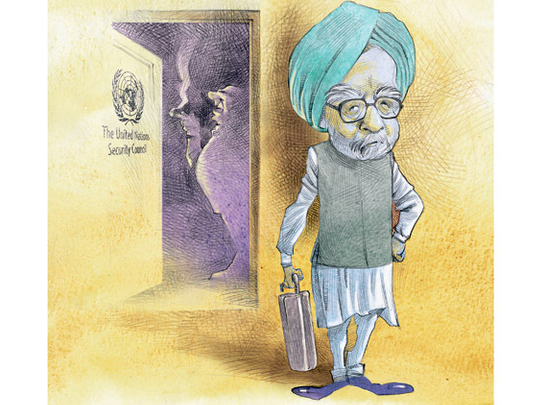
How can a poor and underdeveloped country such as India, despite its size and democratic commitment, meet its responsibility in world affairs when it cannot keep its own house in order?
This was the patronising attitude of the developed countries in the West whenever there was any talk about granting India a permanent seat in the United Nations Security Council (UNSC).
India was judged for the past several decades from the Cold War prism which saw that country as an all-weather friend of the communist Soviet Union. But past perceptions are today changing with the demise of the Soviet Union and the ending of the Cold War.
There is no longer any fundamental opposition from the West to admitting India to what was sardonically referred to as an exclusive ‘rich man's club' for which new entrants needed the goodwill and approval of the five permanent members, Britain, China, France, Russia and the US.
There is delicious irony in the fact that China was fiercely backed decades ago by India for a permanent Security Council seat. Indeed, India's visionary — but not always practical — first prime minister Jawaharlal Nehru declined a permanent seat offered to the country after independence, saying that India would take up its seat only after China got its "rightful place" in the UNSC.
Meanwhile, over three decades have passed since China was given a permanent seat and India is still knocking at the door for admittance into the Security Council.
The five permanent members have displayed an amazing sense of nonchallance when it comes to issues of crucial interest to the world. If one analysed their behaviour patterns in the past decades, one can conclude that the motivation behind their decisions has been to preserve their self-interest first and, as long as these were served, they did not mind deciding what was good for the world. The veto has been used, more often than not, in the exercise of vested interests of individual powers or power blocs.
There is an urgent need to reform the anachronist post-war structure of the UN, which does not reflect the realities of the new century. For one, the two colonial powers, Britain and France, look a pale shadow of their past. Their continuing inclusion in Security Council is as unquestionable as the exclusion of other deserving candidates.
Britain's once celebrated ‘Jewel in the Crown' — India — is today a very emancipated force in global affairs and, despite all its imperfections, it has steadfastly kept its commitment to democracy. It also wields a much greater economic clout today than France and Britain together do.
The Group of Four members — Brazil, Germany, Japan and India — want to reform the UN, though they are equally keen to become permanent members of the Security Council.
During his just-concluded visit to India, German Foreign Minister Guido Westerwelle whose liberal Free Democratic Party forms a coalition government in Berlin with Chancellor Angela Merkel's conservative Christian Democratic Union, reinforced the urgency to reform the UN.
German politicians, aggressively campaigning for a Security Council seat, know only too well that there would be impediments in the way if Germany were to alone campaign for a Security Council seat. Joining forces with other three candidates in the G4 offers the best possible way to the goal.
Germany faces strong opposition from Italy which itself aspires to become a permanent Security Council member, while Japan has already got the cold shoulder from China, and Brazil needs the strong acceptance in the international community as a potential candidate for the Security Council seat.
Rotation principle
Both India and Germany were recently elected as non-permanent members of the Security Council according to the rotation principle. Both maintain that they can achieve a lot more towards reforming the UN once they are inside the body rather than from outside.
However, this will not be an easy task but persistence can still pay off. The reality is that the permanent members of the Security Council have become a closed fraternity that will not welcome any newcomers.
If the reforms are not instituted at the UN, including the Security Council, it would not do justice to the changed global situation which has witnessed the emergence of new powers whose weight in world affairs has not been appreciated because of the myopic and self-centred interest of the permanent members of the Security Council.
By letting the United Nations function as before, the august body would lose the high moral authority which it was supposed to be impregnated with at the time of its creation.
The UN would be reduced to the status of a pathetic machine that merely churns out tonnes and tonnes of paper to record resolutions, minutes of long-drawn meetings that achieve little, etc. And wasting such colossal mountains of paper in today's ecology-conscious world is a luxury we can ill afford.
Manik Mehta is a commentator on Asian affairs.











